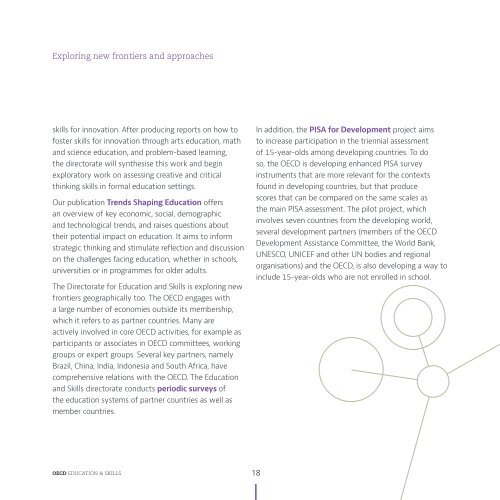Directorate-for-education-and-skills-brochure.pdf?utm_content=bufferf4a33&utm_medium=social&utm_source=twitter
Directorate-for-education-and-skills-brochure.pdf?utm_content=bufferf4a33&utm_medium=social&utm_source=twitter
Directorate-for-education-and-skills-brochure.pdf?utm_content=bufferf4a33&utm_medium=social&utm_source=twitter
Create successful ePaper yourself
Turn your PDF publications into a flip-book with our unique Google optimized e-Paper software.
Exploring new frontiers <strong>and</strong> approaches<strong>skills</strong> <strong>for</strong> innovation. After producing reports on how tofoster <strong>skills</strong> <strong>for</strong> innovation through arts <strong>education</strong>, math<strong>and</strong> science <strong>education</strong>, <strong>and</strong> problem-based learning,the directorate will synthesise this work <strong>and</strong> beginexploratory work on assessing creative <strong>and</strong> criticalthinking <strong>skills</strong> in <strong>for</strong>mal <strong>education</strong> settings.Our publication Trends Shaping Education offersan overview of key economic, social, demographic<strong>and</strong> technological trends, <strong>and</strong> raises questions abouttheir potential impact on <strong>education</strong>. It aims to in<strong>for</strong>mstrategic thinking <strong>and</strong> stimulate reflection <strong>and</strong> discussionon the challenges facing <strong>education</strong>, whether in schools,universities or in programmes <strong>for</strong> older adults.The <strong>Directorate</strong> <strong>for</strong> Education <strong>and</strong> Skills is exploring newfrontiers geographically too. The OECD engages witha large number of economies outside its membership,which it refers to as partner countries. Many areactively involved in core OECD activities, <strong>for</strong> example asparticipants or associates in OECD committees, workinggroups or expert groups. Several key partners, namelyBrazil, China, India, Indonesia <strong>and</strong> South Africa, havecomprehensive relations with the OECD. The Education<strong>and</strong> Skills directorate conducts periodic surveys ofthe <strong>education</strong> systems of partner countries as well asmember countries.In addition, the PISA <strong>for</strong> Development project aimsto increase participation in the triennial assessmentof 15-year-olds among developing countries. To doso, the OECD is developing enhanced PISA surveyinstruments that are more relevant <strong>for</strong> the contextsfound in developing countries, but that producescores that can be compared on the same scales asthe main PISA assessment. The pilot project, whichinvolves seven countries from the developing world,several development partners (members of the OECDDevelopment Assistance Committee, the World Bank,UNESCO, UNICEF <strong>and</strong> other UN bodies <strong>and</strong> regionalorganisations) <strong>and</strong> the OECD, is also developing a way toinclude 15-year-olds who are not enrolled in school.OECD EDUCATION & SKILLS 18


